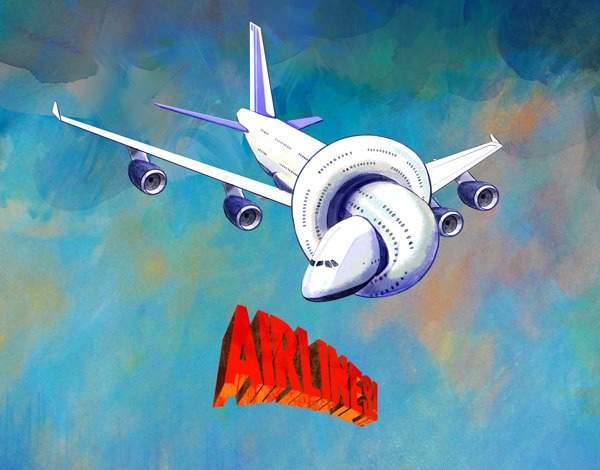
Covid travel bans and the rise of Zoom have plunged airlines into a nosedive. When we do finally take to the skies again, the industry – and the way we travel – will look very different
Many bold predictions have been made for the way the Covid-19 pandemic will change the way we live. Most will turn out to be wishful thinking. The moment the weather gets bad, we’ll stop cycling to work. Try getting a teenager to give up buying cheap, fast fashion. But one area looks like it might change for good: travel – in particular air travel.
No sector has been as badly affected by the pandemic. Since March, at least 13 airlines have collapsed or filed for bankruptcy, including Flybe in the UK, Virgin Australia, South America’s biggest airline Latam, and Level Europe, the low-cost Austrian airline owned by British Airways’ parent company IAG. Others are making swingeing cuts and refinancing in a desperate battle to survive. Some 10,000 British Airways pilots, cabin crew and other workers – a quarter of the flag carrier’s staff – are losing their jobs. Richard Branson has had to pull out of Gatwick and raise $1.6 billion in new funding to secure the future of Virgin Atlantic.
Covid has wiped out seven years of air passenger traffic growth, the International Air Transport Association says. Rather than increase by 4 per cent this year, air-transport revenues will fall by 50 per cent, to $419 billion. When demand does begin to return, the most lucrative sector of the market, business travel, is unlikely to recover to 2019 levels any time soon, if ever, as companies cut costs and exploit videoconferencing technology, which has proved remarkably productive during lockdown.
The result, reckons Andrew Lobbenberg, senior aviation analyst at HSBC, is that aviation is facing ‘its worst crisis in living memory’.
One thing is certain: flying will be a very different experience in future. Some short-term changes are relatively easy to predict – and, in fact, are already happening. All over the world, airlines are so desperate for cash they are offering some of the best bargains ever. You can currently fly from London to many destinations in the Middle East and beyond for less than £500 return in economy and less than £2,000 in business.
In real terms, those are bigger discounts than after 9/11 and the global financial crisis. Aviation analyst Andrew Charlton predicts unprecedented offers in the New Year, such as half-price fares and free travel for children.
Fares may be low for the next year or so, but the number of destinations we can fly to will shrink as airlines trim fleets and routes to match reduced demand. Chris Tarry of analysts CTAIRA expects a ‘structural reduction in capacity of some 30 per cent’ across the industry, with up to a quarter of loss-making routes axed.
As a result, airlines will become greener – not just by flying fewer routes but also by using newer, more environmentally friendly jets. British Airways has brought forward its decision to scrap its 31 gas-guzzling Boeing 747 jumbos. Airlines everywhere are also racing to dump their four-engined Airbus A340s and Airbus 380 superjumbos.
In future, they will rely on twin-engine Boeing 787 Dreamliners, Airbus A350s and the new Boeing 777-ER. Airports will shrink, too, as they adjust to reduced demand. The long-planned third runway at Heathrow airport, Europe’s busiest international hub, is almost certainly for the birds. Dubai has already canned its proposed new five-runway hub – its name, World Central, now an eerie echo of an earlier soaraway era.
The Gulf super-connectors – Emirates, Etihad and Qatar Airways – are suffering and are likely to continue to suffer as passengers opt to fly direct to limit risk of infection, rather than transiting through crowded Middle East superhubs. Reduced flight frequency will also make connecting less attractive.
Overall, it will be long-haul international carriers, such as the ‘Gulfies’ and legacy European carriers, that face the biggest challenges, as they are more dependent on business travellers and their leisure passengers tend to be older and thus less likely to risk flying, for the time being at least.
By contrast, many passengers who fill the seats on short-haul budget carriers are the under-40s who aren’t worried about contracting the virus. Love Island, here we come! The need to speed up flows through airports to minimise contact between staff and passengers has, ironically, spurred big improvements for passengers. Powerful new x-rays can scan hand luggage without the need to remove liquids and electrical equipment. Predeparture testing is identifying passengers with Covid symptoms. New, strictly controlled boarding and exiting procedures prevent the usual scrum to get on and off the plane.
Alas, however, some of the glamour and pioneering spirit of travel is being lost. It’s not just mask-wearing, which is likely to endure long after a vaccine is found – just to be safe. Qantas has shelved plans to start flying non-stop from London to Sydney next year. Travelling from Heathrow direct to Darling Harbour for lunch will have to wait.
***
Looking further ahead, the most important innovations will be green technology. Covid-19 coincides with growing concerns about the climate emergency. Airlines know they will have to innovate as never before to persuade passengers to keep flying and governments to hold off imposing tough regulation.
France’s €15 billion aid package for its aerospace sector is linked to a £1 billion research-and-development fund to help Toulouse-based Airbus launch a zero-emissions short-haul passenger jet.
Shareholders will help to drive environmental innovation. A record two-thirds of proposals filed for upcoming shareholder meetings focus on environmental issues, data from asset manager Nuveen shows.
‘The emissions discussion will play an even more important role,’ says Noel Josephides, a veteran of the travel industry and former chair of Abta, the British travel association. Airlines and aircraft manufacturers are responding.
In September Airbus unveiled three designs for hydrogen-powered aircraft, which promise near zero emissions: a turbofan jet with capacity for as many as 200 passengers (similar to its A321neo narrow-body) that can fly more than 2,000 nautical miles; a propeller plane that would seat about 100 passengers for smaller distances; and a flying-wing concept with 200 seats. Chief executive Guillaume Faury hopes they will be taking passengers short distances, for instance from London to Amsterdam, as soon as 2035.
The race is also on to find greener aviation fuels. Etihad has partnered with Boeing and engine maker GE, among others, to establish a sustainable fuel research facility in Abu Dhabi, fuel from which has already been used in flight. Like many airlines, Etihad aims to achieve net zero CO2 emissions by 2050, starting by halving emissions by 2035. Synhelion, a Swiss company, is working on a completely green jet fuel.
Jeff Engler, CEO of Wright Electric, which is developing a 180-seat electric jet in collaboration with Easyjet, predicts: ‘All short flights can be hybrid or all-electric by 2040.’
After short-term discounting, the long-term trajectory for prices may be upwards. The dip in business travel, which generates more than half of most airlines’ profits, will force airlines to raise prices in all cabins to make up the lost revenues.
What’s more, there are likely to be fewer airlines, which will reduce competition. Some analysts say Etihad and Emirates will merge to produce a single UAE flag carrier flying from dual hubs, one in Abu Dhabi and one in Dubai. The decline in business travel will spur other changes. Many carriers will adopt a ‘premium leisure’ strategy and try to persuade more people to spend more money flying to the beach.
British Airways’ Barbados service is back at Heathrow for the first time since 2003, when the last Concorde flew to the Caribbean island. Heathrow is a more popular departure point for wealthy travellers and BA can charge a premium for tickets. New leisure routes to the Caribbean, the Middle East and the US will soon appear on departure screens at BA’s T5 hub. Virgin is starting services to Pakistan to capture more of the ‘visiting friends and family’ market.
Almost all carriers will reconfigure their jets with fewer business and first-class seats and more premium economy seats. Qatar Airways plans to dump first class altogether when it retires its A380s in favour of A350s and 787s. Improvements in passenger comfort are likely to endure – and get better still.
‘Existing technology will become more popular faster than expected,’ says Andrew O’Connor of Sita, a Swiss-based airport technology company. He predicts facial recognition technology will replace boarding passes and passports – and the queues at check-in and immigration that go with them. BA, Delta, Qantas and EasyJet have trialled this technology. To reduce queuing, text messages could call individual passengers when it’s their turn to board.
Once on board, the new Covid-19-style catering – pre-ordered bento boxes or snacks – could endure, which would be a big improvement in most classes. And germophobes rejoice! The better cleaning introduced in recent months is likely to stick around.
***
One part of the industry that is sure to boom is private aviation, as wealthy passengers seek to fly in their own bubbles.
Clive Jackson, founder of private jet broker FlyVictor, says customer requests ‘are up 55-60 per cent and bookings up 80-85 per cent’ in recent weeks.
Adam Twidell, CEO of UK-based private jet travel provider PrivateFly, part of the major US private aviation group Directional Aviation, explains the appeal: ‘Industry research shows that a typical airline flight involves 700 touchpoints, versus just 20 for a private flight.
‘You can avoid crowds at every stage of the journey. Flyers want a safe journey. Our industry has been able to step in and provide critical point-to-point travel, at a time when commercial flights aren’t viable or attractive to many.’
Flying private will not just be for business. Roar Africa reports a sharp uptick in demand for its bespoke Roar Privé African private jet safaris – week-long trips from $60,000 per person for eight people.
‘I would never have thought to put it out there during normal times,’ says Roar Africa chief executive Deborah Calmeyer, because of the additional cost of the trips. ‘But these are not normal times.’
One casualty of the disruption will be the in-flight magazine. Emirates, United and Delta have removed reading material from seats to cut costs and weight. BA is following. I’m glad to say, however, that Spear’s will still be available in airports around the globe.
Illustration by Paul Collicutt
This piece is from issue 77 of Spear’s magazine, out now. Click here to buy and subscribe
Past Spear’s cover stories:
The Colour of Money: How the Black Lives Matter movement is changing the world of wealth
Cover Story: Is this the death of dividends?
Cover story: where will Covid-19 leave us in five years?











